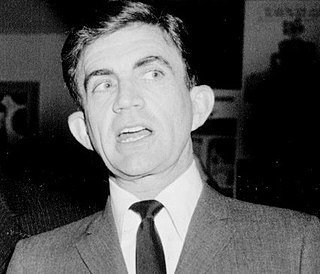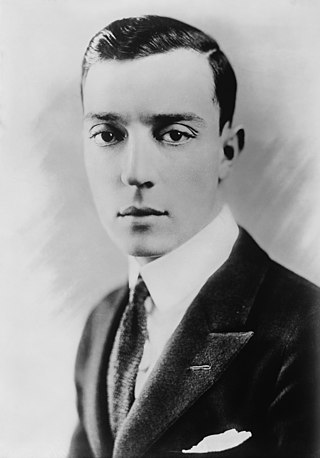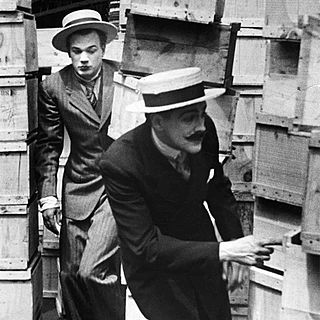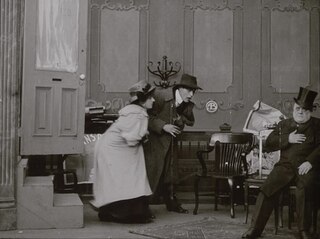Too Much Johnson may refer to:
- Too Much Johnson (1938 film), an American silent comedy film
- Too Much Johnson (1919 film), a lost American silent comedy film
Too Much Johnson may refer to:

The comedy film is a film genre that emphasizes humor. These films are designed to amuse audiences and make them laugh. Films in this genre typically have a happy ending, with dark comedy being an exception to this rule. Comedy is one of the oldest genres in film, and it is derived from classical comedy in theatre. Some of the earliest silent films were slapstick comedies, which often relied on visual depictions, such as sight gags and pratfalls, so they could be enjoyed without requiring sound. To provide drama and excitement to silent movies, live music was played in sync with the action on the screen, on pianos, organs, and other instruments. When sound films became more prevalent during the 1920s, comedy films grew in popularity, as laughter could result from both burlesque situations but also from humorous dialogue.

Blake Edwards was an American film director, producer, screenwriter, and actor.

Joseph Frank "Buster" Keaton was an American actor, comedian and filmmaker. He is best known for his silent films during the 1920s, in which he performed physical comedy and inventive stunts. He frequently maintained a stoic, deadpan facial expression that became his trademark and earned him the nickname "The Great Stone Face".

Harold Clayton Lloyd Sr. was an American actor, comedian, and stunt performer who appeared in many silent comedy films.
Camille may refer to:

Too Much Johnson is a 1938 American silent comedy film written and directed by Orson Welles. An unfinished film component of a stage production, it was made three years before Welles directed Citizen Kane, but it was never publicly screened. It was shot to be integrated into Welles's Mercury Theatre stage presentation of William Gillette's 1894 comedy, but the film sequences could not be shown due to the absence of projection facilities at the venue, the Stony Creek Theatre in Connecticut. The resulting plot confusion reportedly contributed to the stage production's failure.

The Strong Man is a 1926 American silent comedy film starring Harry Langdon, who produced the film. It was directed by Frank Capra in his feature debut.
Winner(s) or The Winner(s) may refer to:
Simple life or simple living refers to practices that promote simplicity in one's lifestyle.
Never Too Late may refer to:

The Lottery Man is a 1916 American silent comedy film written by Theodore Wharton and Rida Johnson Young. It was directed by Leopold Wharton and Wharton, and stars Oliver Hardy, Thurlow Bergen and Lottie Alter. It was produced at the Whartons Studio in Ithaca, New York, and distributed by Whartons Studio. The film was released on June 26, 1916. A print of the film exists in the film archive of the Library of Congress.

Around the World is a musical based on the 1873 Jules Verne novel Around the World in Eighty Days, with a book by Orson Welles and music and lyrics by Cole Porter. It involves an around-the-world adventure by Phileas Fogg. The expensive musical extravaganza opened on Broadway in May 1946 but closed after 75 performances.
Yes or No or Yes/No may refer to:

Too Much Johnson is a lost 1919 American silent comedy film produced by Famous Players–Lasky and distributed by Paramount Pictures. It was directed by Donald Crisp during his phase as an important film director. This film stars in the leads Bryant Washburn and Lois Wilson.

Her First Biscuits is a 1909 American silent short comedy film written by Frank E. Woods, directed by D. W. Griffith, and starring John R. Cumpson and Florence Lawrence. At its release in June 1909, the comedy was distributed to theaters on a "split reel", which was a single projection reel that accommodated more than one motion picture. It shared its reel with another Biograph short directed by Griffith, the drama The Faded Lilies. Prints of both films are preserved in the film archive of the Library of Congress.

Too Much Money is a 1926 American silent romantic comedy film directed by John Francis Dillon and starring Lewis Stone and Anna Q. Nilsson.
Too Many Crooks is a 1959 British comedy film directed by Mario Zampi.

Too Much Youth is a 1925 American silent comedy film directed by Duke Worne and starring Ashton Dearholt, Sylvia Breamer, and Eric Mayne. It was shot at studios in San Francisco and on location in areas around the city.

The Road to the Heart is a 1909 American short film, a dramedy directed by D. W. Griffith and produced by the Biograph Company of New York City. Starring David Miles, Anita Hendrie and Herbert Yost, it was filmed over two days in March 1909 at Biograph's studio in Manhattan and released that April in theaters as a film reel split with the Biograph comedy Trying to Get Arrested.
Too Much Money may refer to: